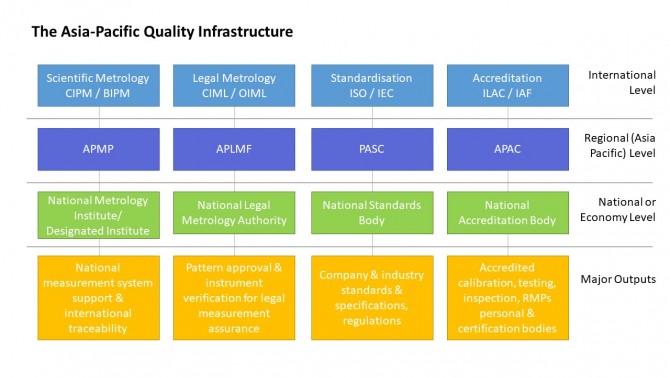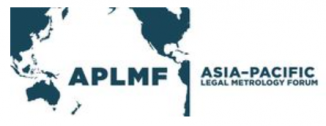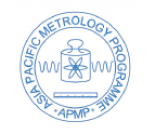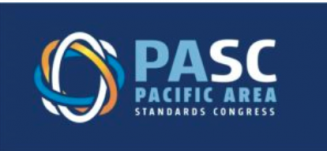Asia Pacific Quality Infrastructure
The Asia Pacific Standards & Conformance/Quality Infrastructure – APEC and the Specialist Regional Bodies.
The Asia Pacific Economic Cooperation (APEC) is a regional economic forum established in 1989 to leverage the growing interdependence of the Asia Pacific. APEC recognises four Specialist Regional Bodies (SRBs) as the expert bodies responsible for the development of the “standards and conformance” or Quality Infrastructure in the Asia Pacific region. The SRBs are independent of APEC but contribute to achieving the outcomes of APEC, liaising directly with the APEC Sub-Committee on Standards and Conformance (https://www.apec.org/Groups/Committee-on-Trade-and-Investment/Sub-Committee-on-Standards-and-Conformance.aspx).

The terms “Quality Infrastructure”, “Standards and Conformance Infrastructure" and "Technical Infrastructure" are interchangeable.
Metrology
Metrology (the science of measurement) is an integral component of the quality infrastructure value chain. Traceability to national measurement standards is fundamental, for example, to the optimisation of production, disease diagnosis and health care, food safety, forensic science, environmental monitoring, occupational health and safety, and consumer confidence and protection.
National measurements standards provide the basis for other conformity assessment activities in both the regulatory and voluntary sectors. Many metrological requirements are supported by legislation or regulation. These aspects become part of an economy’s “legal metrology system”. Metrology is also fundamental to measurement of traded products.
Responsible Regional Organisations:
The Asia-Pacific Legal Metrology Forum (APLMF) is a grouping of legal metrology authorities in APEC economies and other economies on the Pacific Rim, whose objective is the development of legal metrology and the promotion of free and open trade in the region through the harmonisation and removal of technical or administrative barriers to trade in the field of legal metrology.
APLMF members collaborate to promote the coordination and integrity of legal metrology activities and services in order to achieve greater harmony of measurement and testing within the Asia-Pacific region and build mutual confidence in legal metrology activities and services among members. Each geographical region has its own Regional Legal Metrology Organization (RLMO).
The Asia-Pacific Metrology Programme (APMP) is a collaboration of the region’s peak measurement institutes with the primary objective of developing regional measurement capabilities and international recognition of these capabilities. This then provides the basis for effective participation in the global Mutual Recognition Arrangement (MRA) of the International Committee for Weights and Measures (the CIPM) whereby signatories establish the degree of equivalence of national measurement standards and recognise each other’s calibration and measurement certificates. Each geographical region has its own Regional Metrology Organization (RMO), recognised under the CIPM MRA.
Standards
Standards (i.e. documentary standards) encompass a wide range of areas, and are a fundamental enabler to industry competitiveness, product functionality and compatibility, and ensuring the safety and quality of products and services. By providing a coherent basis to harmonise technical specifications of products and services, international standards reduce barriers to international trade and lay the foundation to wider market access.
Standards include specifications, regulations and procedural requirements. Adherence to standards can be either to voluntary documents or to mandatory regulation and laws. Standards are written by international organisations, national standards bodies, regulatory authorities, and trade and industry associations, with the active participation of stakeholders including technical experts from industry, government, academia, consumer groups and other affected parties.
Responsible Regional Organisation:
Pacific Area Standards Congress (PASC) is an independent grouping of Pacific area national standards organisations. One of its primary objectives is to strengthen the international standardisation programmes of the International Organization for Standardization (ISO) and the International Electrotechnical Commission (IEC), and improve the ability of Pacific Rim national standards organisations to participate in these programmes effectively. As part of its role, PASC also facilitates information exchange between national standards bodies and entities interested in standardisation and conformance. It also initiates necessary actions to coordinate international standardisation activities to foster international trade and commerce, and address global needs.
Accreditation and Conformity Assessment
Accreditation is a procedure by which an independent authoritative body (accreditation body) gives formal recognition that a (conformity assessment) body or a person is competent to carry out specific tasks. Accreditation involves the onsite peer assessment of conformity assessment bodies for their competence to carry out specified calibrations, tests, inspections and/or certifications of management systems, products, processes or personnel, to determine if they meet a required standard. These conformity assessment activities are critical to the quality and accuracy of the many products and services upon which all economies rely for, among other things, the health and safety of its citizens, and for trade.
Responsible Regional Organisation
 https://www.apac-accreditation.org
https://www.apac-accreditation.org
The Asia Pacific Accreditation Cooperation (APAC) was established on 1 January 2019 by the amalgamation of two former regional accreditation cooperations – the Asia Pacific Laboratory Accreditation Cooperation (APLAC) and the Pacific Accreditation Cooperation (PAC). APAC ‘s primary role is to manage and expand a mutual recognition arrangement (MRA) among accreditation bodies in the Asia Pacific region. The MRA facilitates the acceptance of conformity assessment results (e.g. test reports, test certificates, inspection reports, and certification) across the region and with other regions around the world. Conformity assessment results that are produced by conformity assessment bodies (CABs) that have been accredited by one APAC MRA signatory are accepted by all the other APAC MRA signatories. This mutual recognition and acceptance of conformity assessment results reduces the need to undertake duplicate testing, inspection or certification, thus saving time and money, increasing economic efficiency and facilitating international trade.




